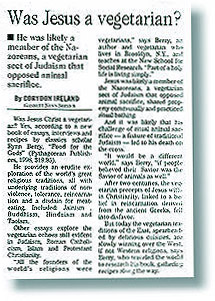![]() Was Jesus Christ
a vegetarian? Yes, according to a new book of essays, interviews and recipes
by classics scholar Rynn Berry, "Food for the Gods" (Pythagorean Publishers,
1998, $19.95).
Was Jesus Christ
a vegetarian? Yes, according to a new book of essays, interviews and recipes
by classics scholar Rynn Berry, "Food for the Gods" (Pythagorean Publishers,
1998, $19.95).
![]() He provides an erudite exploration of the world's great religious traditions,
all with underlying traditions of nonviolence, tolerance, reincarnation
and a disdain for meat-eating. Included: Jainism, Buddhism, Hinduism and
Taoism.
He provides an erudite exploration of the world's great religious traditions,
all with underlying traditions of nonviolence, tolerance, reincarnation
and a disdain for meat-eating. Included: Jainism, Buddhism, Hinduism and
Taoism.
![]() Other essays explore the vegetarian echoes still evident in Judaism, Roman
Catholicism, Islam and Protestant Christianity.
Other essays explore the vegetarian echoes still evident in Judaism, Roman
Catholicism, Islam and Protestant Christianity.
![]() "All the founders of the world's religions were vegetarians," says Berry,
an author and vegetarian who lives in Brooklyn, N.Y., and teaches at the
New School for Social Research. "Part of a holy life is living simply."
"All the founders of the world's religions were vegetarians," says Berry,
an author and vegetarian who lives in Brooklyn, N.Y., and teaches at the
New School for Social Research. "Part of a holy life is living simply."
![]() Jesus was likely a member of the Nazoreans, a vegetarian sect of Judaism
that opposed animal sacrifice, shared property communally and practiced
ritual bathing.
Jesus was likely a member of the Nazoreans, a vegetarian sect of Judaism
that opposed animal sacrifice, shared property communally and practiced
ritual bathing.
![]() And it was likely that his challenge of ritual animal sacrifice - a fixture
of traditional Judaism - led to his death on the cross.
And it was likely that his challenge of ritual animal sacrifice - a fixture
of traditional Judaism - led to his death on the cross.
![]() "It would be a different world," says Berry, "if people believed their
Savior was the Savior of animals as well."
"It would be a different world," says Berry, "if people believed their
Savior was the Savior of animals as well."
![]() After two centuries, the vegetarian precepts of Jesus within Christianity,
linked to a belief in reincarnation derived from the ancient Greeks, fell
into disfavor.
After two centuries, the vegetarian precepts of Jesus within Christianity,
linked to a belief in reincarnation derived from the ancient Greeks, fell
into disfavor.
![]() But today the vegetarian traditions of the East, spearheaded by delicious
cuisines, are slowly winning over the West, if not Western religions,
says Berry, who traveled the world to research his book, gathering recipes
along the way.
But today the vegetarian traditions of the East, spearheaded by delicious
cuisines, are slowly winning over the West, if not Western religions,
says Berry, who traveled the world to research his book, gathering recipes
along the way.
